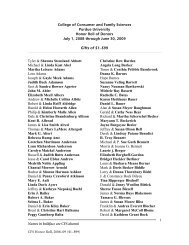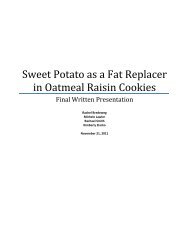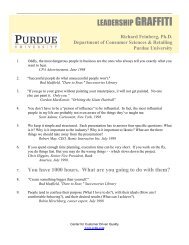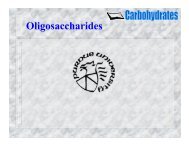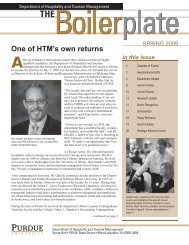alumni news - College of Health and Human Sciences - Purdue ...
alumni news - College of Health and Human Sciences - Purdue ...
alumni news - College of Health and Human Sciences - Purdue ...
You also want an ePaper? Increase the reach of your titles
YUMPU automatically turns print PDFs into web optimized ePapers that Google loves.
CFS Recognizes Two Leaders with Honorary Doctorates<br />
Dr. Munro Peacock <strong>and</strong> Peggy Wild received Honorary Doctor <strong>of</strong> Science <strong>and</strong> Honorary<br />
Doctor <strong>of</strong> Letters degrees, respectively, from <strong>Purdue</strong> University in May 2005.<br />
Dr. Munro Peacock has<br />
distinguished himself as a<br />
world-renowned scientist<br />
who has played a central<br />
role in developing clinical<br />
research at <strong>Purdue</strong> University.<br />
He is currently<br />
director <strong>of</strong> the General<br />
Clinical Research Center<br />
at Indiana University School <strong>of</strong> Medicine.<br />
Dr. Peacock is internationally known<br />
for his work in calcium metabolism <strong>and</strong><br />
genetic <strong>and</strong> biochemical determinants <strong>of</strong><br />
bone mineral density. He has provided<br />
great leadership in building collaborative<br />
programs between <strong>Purdue</strong> <strong>and</strong> the IU<br />
School <strong>of</strong> Medicine.<br />
Born <strong>and</strong> raised in Darvel, Scotl<strong>and</strong>,<br />
Dr. Peacock was educated at Glasgow<br />
University, earning a bachelor <strong>of</strong> medicine<br />
degree <strong>and</strong> a bachelor <strong>of</strong> surgery degree<br />
in 1960, <strong>and</strong> at the Royal <strong>College</strong> <strong>of</strong> Physicians<br />
(RCP) in London, where he earned<br />
status as a member <strong>of</strong> RCP in 1968 <strong>and</strong> as<br />
a fellow <strong>of</strong> RCP in 1978. He did his residency<br />
at St. Mary’s Hospital in London<br />
<strong>and</strong> at MRC Rheumatism Unit in Taplow,<br />
Engl<strong>and</strong>, between 1960 <strong>and</strong> 1965. He<br />
held positions at Leeds University in Engl<strong>and</strong><br />
<strong>and</strong> Harvard University between<br />
1965 <strong>and</strong> 1986.<br />
During those 20 years, Dr. Peacock<br />
was directly involved in the classification<br />
<strong>of</strong> the hypercalciurias that is now in regular<br />
use in clinical practice throughout the<br />
Western world.<br />
Dr. Peacock joined the faculty at the<br />
IU School <strong>of</strong> Medicine in 1986. Since moving<br />
to the United States, he has widened<br />
the scope <strong>of</strong> his scientific studies. He has<br />
increasingly shown interest in childhood<br />
growth <strong>and</strong> development <strong>and</strong> has made<br />
significant contributions to the field.<br />
Munro Peacock Peggy Wild<br />
4 focus: Consumer <strong>and</strong> Family <strong>Sciences</strong><br />
Peggy Wild has distinguished<br />
herself in education<br />
as an energizer <strong>of</strong><br />
teachers across the nation,<br />
transforming the way the<br />
family <strong>and</strong> consumer<br />
sciences (FACS) curriculum<br />
is taught in Indiana <strong>and</strong><br />
beyond.<br />
She is the state specialist in FACS education<br />
in the Office <strong>of</strong> Career <strong>and</strong> Vocational<br />
Services for the Indiana Department<br />
<strong>of</strong> Education. She is credited with providing<br />
leadership, vision, <strong>and</strong> determination<br />
in spearheading both state <strong>and</strong> national<br />
curriculum revisions to move middle <strong>and</strong><br />
secondary school teaching <strong>of</strong> family <strong>and</strong><br />
consumer sciences into the 21st century.<br />
Wild has collaborated extensively with<br />
<strong>Purdue</strong> <strong>and</strong> is an active member <strong>of</strong> the<br />
Consumer <strong>and</strong> Family Science Education<br />
Advisory Board.<br />
Raised in Tucson, Arizona, Wild<br />
received all <strong>of</strong> her degrees at the University<br />
<strong>of</strong> Arizona, earning a BS in home economics<br />
education in 1968, a BA in elementary<br />
education in 1971, an MS in<br />
home economics in 1975, <strong>and</strong> a doctorate<br />
in secondary education in 1979.<br />
In 1981, she moved to New Hampshire<br />
<strong>and</strong> taught at Kingswood Regional<br />
High School, later becoming the state<br />
supervisor for vocational home economics<br />
for the Department <strong>of</strong> Education. From<br />
there, she became director <strong>of</strong> education,<br />
publications, <strong>and</strong> annual meetings for the<br />
American Home Economics Association<br />
<strong>and</strong> national marketing manager <strong>of</strong> vocational<br />
education for McGraw-Hill School<br />
Publishing Company.<br />
Wild has earned numerous career<br />
honors, including the Indiana Association<br />
<strong>of</strong> Career <strong>and</strong> Technical Education Award<br />
<strong>of</strong> Merit in 2004.<br />
<strong>news</strong><br />
Research Finds Races<br />
React Differently to<br />
Dietary Salt, Calcium<br />
Research in the Department <strong>of</strong> Foods<br />
<strong>and</strong> Nutrition shows that African American<br />
<strong>and</strong> Caucasian adolescent girls h<strong>and</strong>le<br />
sodium <strong>and</strong> calcium differently, which<br />
may help explain why the two races<br />
have different rates <strong>of</strong> hypertension <strong>and</strong><br />
osteoporosis.<br />
The findings are based on results<br />
from Camp Calcium, a summer camp<br />
conducted by the Department <strong>of</strong> Foods<br />
<strong>and</strong> Nutrition <strong>and</strong> funded by the<br />
National Institutes <strong>of</strong> <strong>Health</strong> since 1990.<br />
The camp is designed to investigate various<br />
aspects <strong>of</strong> calcium metabolism in<br />
adolescent girls <strong>and</strong> boys.<br />
“While we found a racial difference<br />
in calcium retention in adolescents, we<br />
also confirmed that African Americans<br />
retain more sodium on a high-salt diet<br />
than Caucasians,” said Connie Weaver,<br />
distinguished pr<strong>of</strong>essor <strong>and</strong> head,<br />
Department <strong>of</strong> Foods <strong>and</strong> Nutrition.<br />
“This proves that salt is processed differently<br />
in the races, but too much in the<br />
diet reduces bone density in both races.”<br />
Other camp findings include:<br />
■ Adolescent girls need to have the<br />
equivalent <strong>of</strong> four cups <strong>of</strong> milk a day to<br />
take full advantage <strong>of</strong> the time when<br />
their bodies develop peak bone mass.<br />
■ Adolescent girls keep 25 percent<br />
<strong>of</strong> the net calcium they consume, but by<br />
the time they are young women, it drops<br />
to 5 percent.<br />
■ Caucasian adolescent girls lose<br />
more calcium through their urine than<br />
African American girls.<br />
For more information on Camp<br />
Calcium, visit www.cfs.purdue.edu/fn/<br />
campcalcium or call the department at<br />
(765) 494-8228.



